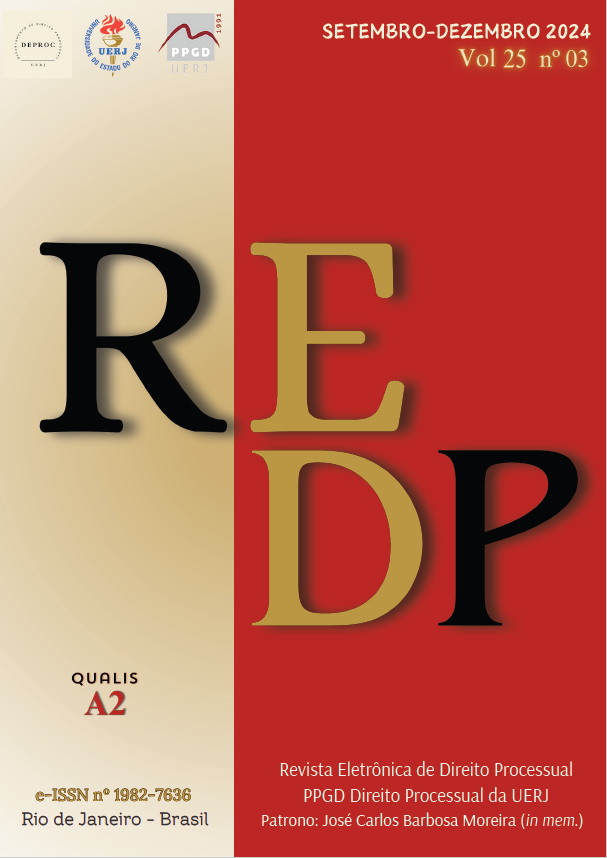PERSPECTIVAS DE APRIMORAMENTO DO CONTROLE JURISDICIONAL DE POLÍTICAS PÚBLICAS: A RELATIVIZAÇÃO DA COISA JULGADA E A REMODELAGEM DA ESTRUTURA ADMINISTRATIVA DOS ÓRGÃOS JULGADORES
DOI:
https://doi.org/10.12957/redp.2024.86588Resumo
O controle jurisdicional de políticas públicas é uma realidade decorrente do papel assumido pelo Poder Judiciário no Estado Democrático de Direito, no qual a tutela dos direitos fundamentais e o estabelecimento de meios efetivos de sua concretização é a finalidade do Estado. No entanto, o sistema jurídico brasileiro, seja em termos de gestão de tribunais, seja no que toca ao próprio processo civil, ainda não assimilou na integralidade essa nova perspectiva, o que compromete qualitativamente o aspecto decisório do controle. Através de revisão bibliográfica da doutrina especializada e da análise da realidade específica dos Tribunais, partindo de experiências análogas, o presente estudo busca analisar as propostas possíveis para o aprimoramento do controle jurisdicional das políticas públicas, indicando, ao final, uma solução administrativa – a criação de varas judiciais especializadas, concomitante à dotação de maior estrutura técnica aos quadros dos tribunais, para lidar com as demandas atinentes ao controle jurisdicional de políticas públicas – e outra processual – a relativização da coisa julgada quanto aos meios eleitos pelo Judiciário para implementar a política pública – para a superação desse status quo, ciente de que, para o tratamento dessa matéria, é fundamental ter como norte o aspecto de efetivação dos direitos fundamentais. Tais propostas derivam das duas conclusões deste trabalho, no sentido de que as estruturas processuais hoje existentes, baseadas em uma concepção clássica do processo civil, não são adequadas ao standard contemporâneo de controle, e que é necessário buscar uma integração entre soluções processuais (perspectiva teórica) com mecanismos administrativos de gestão (perspectiva fático-concreta).
Downloads
Publicado
Como Citar
Edição
Seção
Licença
Copyright (c) 2024 Acácio Acácio Miranda Silva Filho, Arthur Paku Ottolini Balbani

Este trabalho está licenciado sob uma licença Creative Commons Attribution 4.0 International License.
Todos os artigos publicados na Revista Eletrônica de Direito Processual (REDP) (Departamento de Direito Processual, Universidade do Estado do Rio de Janeiro, Brasil) são licenciados por meio de uma Licença Creative Commons - Atribuição 4.0 Internacional (CC BY 4.0).
Os autores retêm os direitos autorais de seu artigo e concordam em licenciar seu trabalho com a licença CC BY 4.0, aceitando assim os termos e condições específicos desta licença disponíveis no seguinte website: https://creativecommons.org/licenses/by/4.0/legalcode.
- Os autores concedem à REDP o direito de primeira publicação, de se identificar como publicadora original do trabalho e concedem à revista uma licença de direitos não exclusivos para utilizar o trabalho das seguintes formas: Reproduzir, vender e distribuir cópias eletrônicas ou impressas do manuscrito como um todo, de partes específicas do manuscrito e de suas traduções para qualquer idioma;
- O uso do artigo por terceiros é livre, contanto que a integridade da publicação seja mantida e seus autores originais, periódico de primeira publicação e detalhes de citação sejam identificados.
Dentro dos termos da licença, os autores podem entrar em acordos contratuais adicionais separados para a distribuição não exclusiva da versão publicada do trabalho na revista.
Copyright and Licensing
All articles published in the Procedural Law Electronic Review (REDP) (Department of Procedural Law, State University of Rio de Janeiro, Brazil) are licensed under a Creative Commons License - Attribution 4.0 International (CC BY 4.0).
- Authors retain copyright to their article and agree to license their work under the CC BY 4.0 license, thereby accepting the specific terms and conditions of this license available at the following website: https://creativecommons.org/licenses/by/4.0/ legal code.
- Authors grant REDP the right of first publication, to identify itself as the original publisher of the work, and grant the journal a non-exclusive license to use the work in the following ways: Reproduce, sell and distribute electronic or printed copies of the manuscript as a whole, of specific parts of the manuscript and its translations into any language;
- Use of the article by third parties is free, as long as the integrity of the publication is maintained and its original authors, first publication journal, and citation details are identified.
Within the terms of the license, authors may enter into separate additional contractual agreements for the non-exclusive distribution of the published version of the work in the journal.




